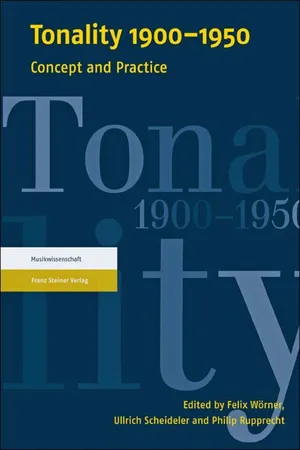
- 278 pages
- English
- PDF
- Available on iOS & Android
About this book
Tonality – or the feeling of key in music – achieved crisp theoretical definition in the early 20th century, even as the musical avant-garde pronounced it obsolete. The notion of a general collapse or loss of tonality, ca. 1910, remains influential within music historiography, and yet the textbook narrative sits uneasily with a continued flourishing of tonal music throughout the past century. Tonality, from an early 21st-century perspective, never did fade from cultural attention; but it remains a prismatic formation, defined as much by ideological-cultural valences as by its role in technical understandings of musical practice. Tonality 1900–1950: Concept and Practice brings together new essays by 15 leading American and European scholars.
Tools to learn more effectively

Saving Books

Keyword Search

Annotating Text

Listen to it instead
Information
Table of contents
- Contents
- Contributors
- Introduction
- Tonality as Concept and Category
- Tonality in Austro-German Theory
- Practices of Tonality
Frequently asked questions
- Essential is ideal for learners and professionals who enjoy exploring a wide range of subjects. Access the Essential Library with 800,000+ trusted titles and best-sellers across business, personal growth, and the humanities. Includes unlimited reading time and Standard Read Aloud voice.
- Complete: Perfect for advanced learners and researchers needing full, unrestricted access. Unlock 1.4M+ books across hundreds of subjects, including academic and specialized titles. The Complete Plan also includes advanced features like Premium Read Aloud and Research Assistant.
Please note we cannot support devices running on iOS 13 and Android 7 or earlier. Learn more about using the app